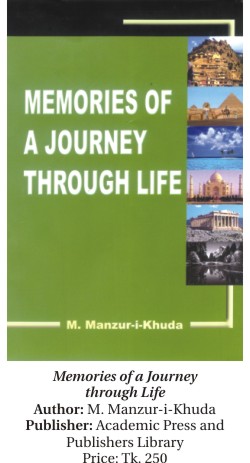|
Book Review
Of Achievements and Disappointments
Tamanna Khan
 Imagine meeting someone who had to ride a camel from Jeddah to Mecca for performing the Hajj (Muslim pilgrimage to the holy city of Mecca)! Quite unthinkable in this era of “home in the air” promise by innumerable airlines! Interestingly, readers will come across such and many other fascinating accounts in Manzur-i- Khuda's Memories of a Journey through Life. Imagine meeting someone who had to ride a camel from Jeddah to Mecca for performing the Hajj (Muslim pilgrimage to the holy city of Mecca)! Quite unthinkable in this era of “home in the air” promise by innumerable airlines! Interestingly, readers will come across such and many other fascinating accounts in Manzur-i- Khuda's Memories of a Journey through Life.
The author's biography, experiences and thoughts on various topics have been presented in the book in one volume with occasional headings to signify the main turns of his life. Born in the middle of the twentieth century, the author has encountered the mayhem of the World War II and the devastating famine that followed. The trauma he felt is very much evident in his description of that period which also witnessed massive occurrences like the Indian Independence Movement and Partition. Although the author is uprooted from his hometown Kolkata, separated from his childhood memories of Madhupur in West Bengal by an imaginary political line called border, he nevertheless finds solace in the friendliness of his Muslim classmates in Chittagong. Yet again in Pakistan with Muslim majority Manzur's children are denied of Bengali language teaching at a school in Karachi on the ground that it is the language of the Hindu community. Through the author's words the reader realises the importance of growing up in a homogenous community where no one is looked down as a minority. Manzur has very deftly presented a number of incidents on the artificial religious rifts in his book. He has also tried to explain the importance of religion, stepping aside from the usual indifference of a scientific mind. Rather he strongly and with rationale opposes the stance of many from his field, who chooses to write off religion and identify it as “the root of all evil”.
A key aspect of the book is that it presents a personal insight into the life of the eminent scientist and educationist Dr. Qudrat-i-Khuda, father of Manzur-i-Khuda. The author not only presents the disciplined life sketch of this great man but also shares the philosophies of his father with the reader. In spite of all the constrains, in the two eras following British Rule, Dr. Qudrat-i-Khuda has relentlessly worked to establish a scientifically equipped modern education system, which to date remains in paper due to the negligence by the authority. Like his father, Manzur has spent the initial years of his life trying in vain to develop the research field of his homeland. However he too has faced corruption and undue barriers in his effort, which led him to settle in a foreign land during the later part of his life. The patriotism of his youth definitely has not been paid off and the author does not restrain from presenting his regrets.
The author has to spend a major portion of his life in various countries across the world for academic and professional reasons. This must have developed an appetite for travel, as one finds the author taking extensive tours all around the globe in his retirement. He presents his view of the developed world in contrast to the developing countries and identifies the lack of discipline as the main retarding force for the Third World nations, including his homeland Bangladesh. The book presents the author's life in a straightforward manner with little poetic expression thus often failing to hold incessant attention. Yet bits of pieces of memories like the author's first homemade bell, encounter with the Jewish priest, exploitation of the law by expatriates, conversion of an Afro-American to Islam do provide an interesting read.
Copyright
(R) thedailystar.net 2010
|

